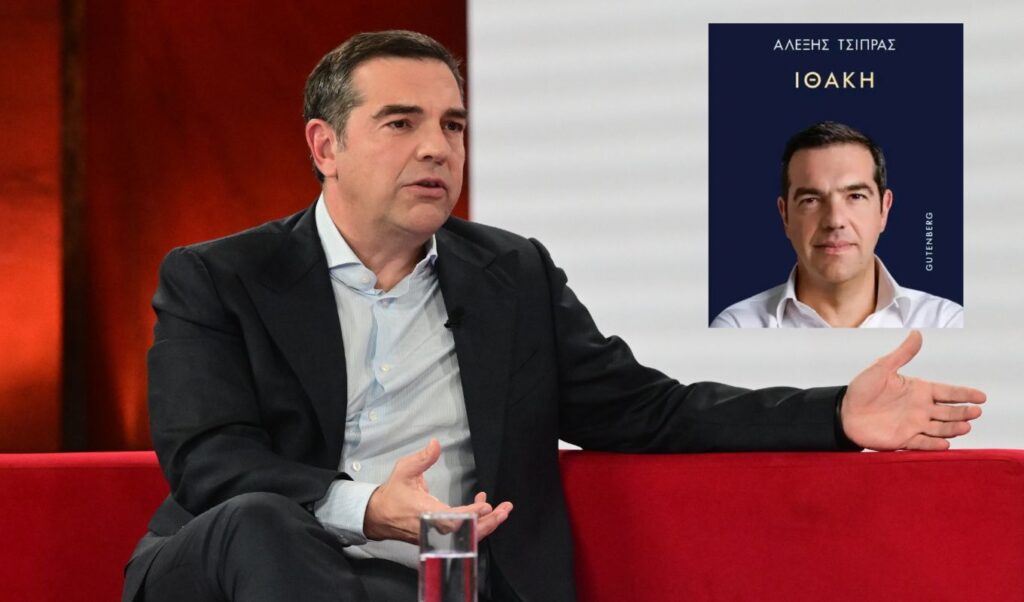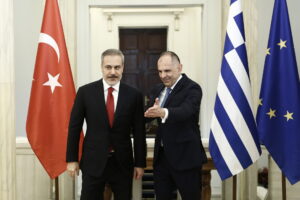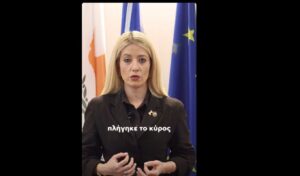Determined to clarify his political journey, provide his own answers to critical questions about his governments’ actions, and illuminate pivotal moments in the country’s recent history, Alexis Tsipras appears in his book “Ithaca,” which hit bookstore shelves this morning.
The former prime minister recounts across 760 pages the difficult period of negotiations with the country’s creditors, discusses his relationships with all European leaders, and reveals the phone call Barack Obama made to him shortly before entering the Summit that led to the third bailout. He challenges Varoufakis’ personality, logic, and plans in every way, states he regretted choosing Zoe Konstantopoulou as Parliament Speaker, and reveals the dialogue he had with Vladimir Putin when he asked for 300 billion euros to help Greece.
He explains what he did to prevent SYRIZA from splitting after Kasselakis’ victory, while also referring to the entertaining dialogue Tyler McBeth had with Betty Baziana. He naturally discusses his governmental cooperation with Panos Kammenos and reveals why he didn’t collaborate with Stavros Theodorakis.
Specifically, regarding his meeting with Panos Kammenos at Koumoundourou, Alexis Tsipras reveals that the ANEL president told him: “I want the Defense Ministry and I won’t impose any conditions on you, I don’t want to be Deputy Prime Minister. I want the Defense Ministry because that was my dream. I want to participate in this effort. Together we’ll create a new national unity. You’ll be Aris Velouchiotis and I’ll be Napoleon Zervas.” Tsipras recounts: “Beyond his usual exaggerations, which I expected, I admit his attitude surprised me… ‘Calm down Panos! Thank you and this all sounds very nice about national reconciliation, but now I need maximum possible support and majority. You understand why. So I’m thinking of proposing that Theodorakis also participate in the Government.’ ‘Don’t bring him. He’ll destroy us, he’ll give everything to outsiders'” (Kammenos replied). Elsewhere he says: “But what the hour brings, time doesn’t bring. Walking up the stairs of Koumoundourou, at some point Theodorakis reaches the floor where Lafazanis’ office was. He meets him in the corridor and Lafazanis addresses him: ‘What do you want here? Don’t bother, the other guy got here first.’ ‘What do you mean?’ he replies. ‘He was upstairs with Kammenos. It’s finished, we found each other,’ he told him.
Regarding his meeting with Russian President Putin and the 300 billion euro loan, he writes: “His answer was not just honest, but I’d say brutal. He told me he’d prefer to give that money we requested to an orphanage, because if he gave it to Greece, it would be like throwing it in a trash can. ‘Find it with Merkel,’ he told me simply and clearly.”
Former Finance Minister Yanis Varoufakis receives “honor” in the book as the former prime minister appears to assign him much responsibility for the negotiation’s course. “Very quickly Varoufakis transformed from an ‘asset’ to a negative protagonist. Who wasn’t tolerated in the Eurogroup not only by opponents, but not even by our potential allies, even his own colleagues,” Alexis Tsipras notes, while revealing he had asked for Giorgos Chouliarakis’ replacement on grounds he was accommodating. As Alexis Tsipras says, “Yanis Varoufakis was characterized by a mixture of intelligence and naivety, as when he went to America to meet the IMF, he called me and said Lagarde supported the Greek government. When Alexis Tsipras asked him where the country would find money to pay its obligations, who would give the money, he answered ‘the Europeans.’ So I told him – Alexis Tsipras notes -: ‘I don’t want to disappoint you but Schäuble provides the money. And whoever provides the money wants their terms too.'”
Alexis Tsipras also reveals a phone conversation with American President Barack Obama after the referendum and shortly before the important Summit that resulted in the third bailout began: “After congratulating me on the referendum result, he told me: ‘I have good news and bad news to convey.’ ‘Shall we start with the good?’ ‘The good news is that after your referendum victory, you’re the master of political developments in Greece.’ ‘And the bad?’ ‘The bad news is that forces have rallied against you who want to torpedo negotiations today and things are very serious. There’s a strong bloc that wants, mainly for political reasons, for negotiations not to be completed and for you to be led to national currency. I can’t tell you details, but one thing I ask, be calm. And know that we’ll be on board throughout, we’ll monitor developments and intervene behind the scenes if needed.'”
The former prime minister also refers to the dramatic hours of the 17-hour negotiation shortly before the final decision was taken. “I stood against them and told them with raised voice and without any willingness to bargain: ‘Okay, you can go back and tell your peoples the decision to expel Greece from the Eurozone. But say it clearly: it was your responsibility. Because what you’re asking isn’t an agreement; it’s humiliation. And we’re not a country defeated in war, we’re a country negotiating with dignity. Don’t forget that’ (…) I couldn’t stand it anymore. I got up and left without looking back. I went upstairs, looked my people in the eyes and told them, simply, tiredly: ‘It’s over.’ I still remember clearly, as if it were yesterday, the scene in the elevator. We were speechless, me, the police officers and Eleni, my secretary, with a look full of anxiety. I broke the silence: ‘Right now we’re in drachma, guys. Everything’s finished.’ I entered the Greek delegation office. There I formed a first picture of the political climate in Greece which was along the lines ‘Don’t sit anymore, get up and leave, this is a coup!'”
Dragasakis was in the room. He sat hunched in a chair, with his elbows resting on the table and his hands holding his head. He was exhausted and mentally broken. I tell him: ‘Yiannis, will the banks hold?’ ‘I don’t know,’ he answered. Pappas, more enthusiastic and inflammable by character, said: ‘Let’s leave, let’s disgrace them ourselves’ (…)
I go back downstairs (…) They’re saying the same things again. ‘This is shameful,’ I tell them, ‘it makes no sense to continue this’ — and I leave again. ‘We stop here. Goodbye!’ For the second time I left the room (…) As I headed to our office, walking in the corridor, I felt someone following me running. It was a well-built French policeman, who came panting to stop me and behind him followed Hollande. We sat together on the small sofa, one at one end and the other at the other, and he started telling me: ‘No, Alexis, we shouldn’t do this. We must stay to overturn this decision’ (…) After Hollande, Tusk came to our office, to tell me he would immediately take initiative to bridge differences so we could reach agreement. ‘We’re not leaving,’ he told me, ‘if we don’t close the agreement’ (…) When negotiations ended and we managed to reach agreement, Merkel came, exhausted and tired, and told me: ‘Alexis, I’ve done thousands of hours of negotiations in my life. I’ve been in negotiations for Ukraine, for Putin… but I’ve never experienced this thing before.’
Of particular interest is the chapter where Tsipras refers to internal party pressures he received and moves he made when he lost the 2023 elections. He mentions the proposal he made to Efi Achtsioglou to lead SYRIZA, whom he assured he would be constantly beside her. He did the same with Alexis Charitsis. But neither of the two accepted. Alexis Tsipras ended up proposing leadership to these two figures because after the 2023 elections, the well-known communications expert and current collaborator Nikos Maratzidis had told him: “You’re finished.” And he continued with another harsh comparison. “You’re like Jewish prisoners being transported to Auschwitz. And you’re at the station before boarding the train. You have two choices. Either board, to find yourself after some days in the crematoria, or try to escape, where again most likely they’ll shoot you.”
The former prime minister also refers to his intervention to prevent SYRIZA from splitting after Stefanos Kasselakis’ victory. “Despite my decision not to get involved, I couldn’t stand it and asked to see Nasos Iliopoulos in an attempt to prevent the split. He received him in my office and I explained that their departure would be a huge political mistake. And that they can’t decide while being carried away by the climate of the base supporting them. He listened carefully. At the end he asked to hug me as he left, as if it were the moment of farewell – or political weaning.”




